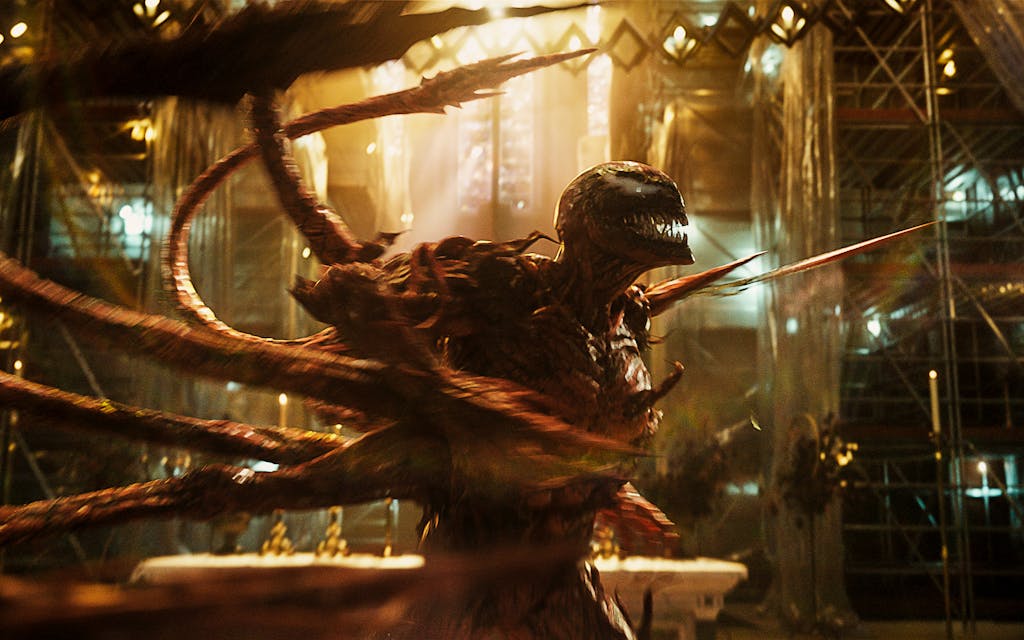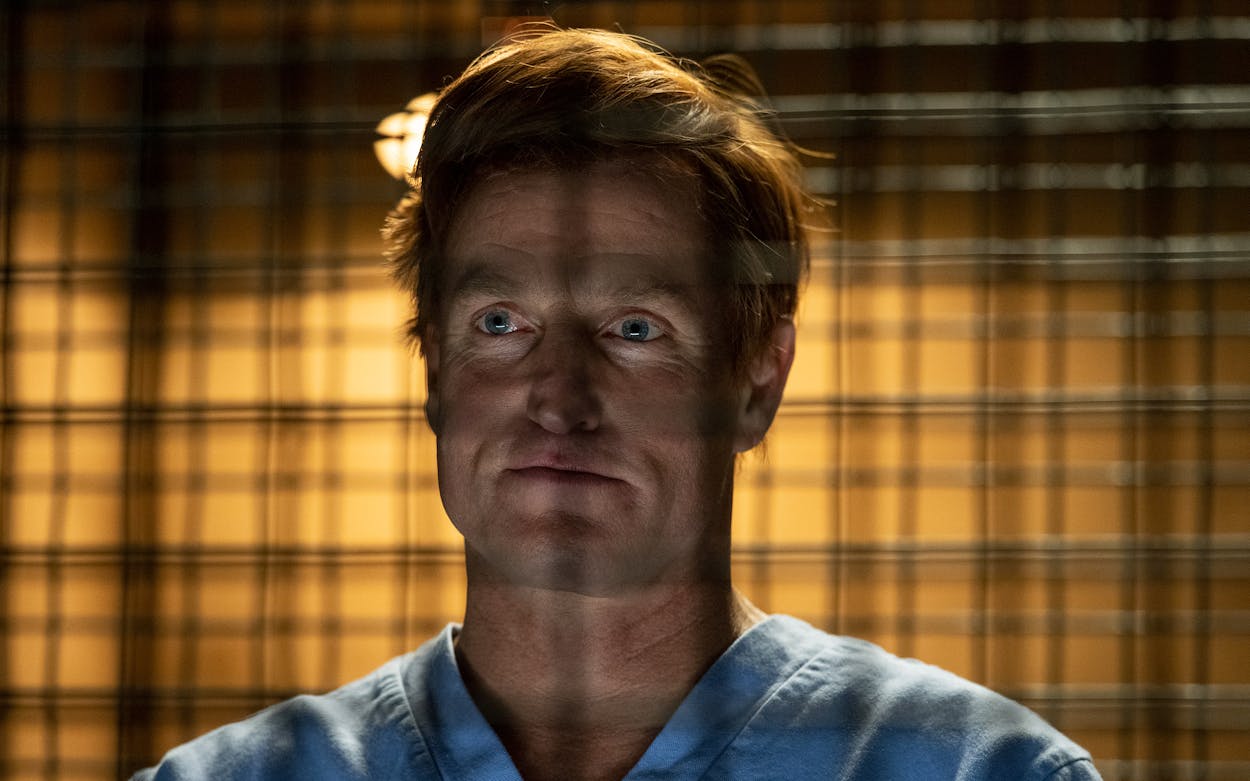All is not well in the Brock-Venom household. “I can’t live like this,” complains Venom, the sinewy, shape-shifting alien symbiote that inhabits Eddie Brock’s body. “I need to be free.” Brock (Tom Hardy) has also had it with his live-in companion’s ceaseless chatter, disgusting habits, and bottomless appetite for human brains that Brock must constantly negotiate down to chicken brains and chocolate.
Such are the conflicts and frictions afflicting the modern couple, and in that regard Venom: Let There Be Carnage picks up where 2018’s Venom left off. Before entering alien-human union, Brock was a narcissistic investigative reporter whose sense of righteousness exceeded his ethics or basic journalistic judgment. He betrayed his fiancée’s trust to try to break a story about egomaniacal tech billionaire Carlton Drake (Riz Ahmed). To be fair, it was a pretty juicy scoop—Drake was using human subjects for illicit, mysterious experiments—but Brock’s careless reporting got both him and his betrothed fired. “You used me,” Anne Weying (Michelle Williams) told Eddie as she broke up with him after she was booted from her firm.
Brock soon learned for himself what it meant to be used, though to a more literal extent, when Venom latched onto his body, which it needed to survive on Earth. And Brock needed Venom and its superherolike strength and near invincibility to survive against Drake’s murderous goons. The beginning of a beautiful friendship, indeed.
But can it last? In Carnage, Venom is frustrated by the way Brock represses the alien’s instincts to eat people (even “bad” ones), claw up buildings and leap great distances, use the full extent of its powers, and perform incredible feats. In a line that teases future conflict with another wall-scaling crusader, Venom boasts, “Responsibility is for the mediocre.” Brock, meanwhile, is only interested in Venom insofar as the creature can aid his reporting, this time about prolific serial killer Cletus Kasady (Midland’s Woody Harrelson, sporting an unbelievable red, mop-top wig that looks like it’ll slip off every time he cocks his head). And Brock still harbors feelings for his ex (ably reprised by Williams), who breaks his heart again when she tells him she’s engaged to surgeon Dan Lewis (Reid Scott).

Amid Brock’s heartbreak, we’re reminded that Venom has an ability Brock can’t reciprocate: access to his thoughts and feelings. The film’s most touching sequence comes when Venom attempts to play wingman and comfort its downtrodden human host. Venom admits it can heal physical wounds, but not emotional ones, and it tries in vain to cheer Brock up with a hilarious, almost-literal kitchen-sink breakfast.
Opposite Brock-Venom is another couple, Harrelson’s Kasady and Naomie Harris’s Frances Barrison, whose love was forged by the shared traumas of abuse and institutional violence. Unfortunately, it’s around these two characters that the film, directed by Andy Serkis and cowritten by Hardy and Kelly Marcel (who also cowrote Venom), falters and collapses under the weight of trying to do too much. Fundamentally, the filmmakers couldn’t decide whether to make the couple sympathetic or not. And that’s a shame, because Harrelson is extremely adept at threading the lovable-psychopath-antihero needle.
And Harris’s character, known as Shriek in the comic books, is left woefully underdeveloped. She’s a mutant—no explanation given—whose extremely high-decibel screams deafen people and destroy things. Barrison and Kasady meet as kids in an orphanage-asylum but are separated when Barrison is moved to a secretive prison run by an abusive scientist. Why does the prison exist, who exactly runs it, and why is it under the scientist’s control? All left to the viewer’s imagination. Kasady’s overriding motive throughout the film is to reunite with Barrison and exact revenge on all those who caused them harm, including Brock, whose reportage landed him on death row. “All I ever wanted was family,” Kasady tells Brock during a prison visit before getting into a scuffle with him and, by extension (literally), Venom, during which Kasady bites off a piece of Venom. This imbues Kasady with his own symbiote, Carnage, which, weirdly and without explanation, harbors its own daddy issues. The result is a story that feels as opaque, formless, and chaotic as Venom when it’s in goop form.
The 2018 film was successful in part because it kept things simple. Carlton Drake was a compelling villain, endowed with just enough characterization to make him patently unlikable and his evil motives plain and convincing. All the humor and thematic development was left to the hands and claws of Brock and Venom. Carnage could’ve easily run back the same play and left Harrelson to revel in Kasady’s murderous psychopathy with a dash of that crooked wit we all know and love. Instead, the story belatedly raises complications it has no time or capacity to resolve. And perhaps the biggest one interrupts the climactic final battle, far too late for it to play out to a satisfying resolution. Kasady reveals to Brock a dark secret about his own childhood—and that he knows about Brock’s own childhood trauma (how Kasady knows this despite spending most of his life behind bars and never meeting Brock is, you guessed it, a complete mystery). What are Brock and Venom—and the audience—supposed to do with that knowledge? Venom’s answer is predictable and clearly meant to evince the same kind of shock humor as the end of Deadpool, but instead the viewer is left mostly unsure, if not squirming.
It didn’t have to be this way. Venom is supposed to provide a good, rollicking time, somewhere between the tidy, droll Avengers and the bawdy, antiheroic Deadpool. This one let out a lot of the fun while in haphazard pursuit of needless complexity. The end credits song should’ve been Avril Lavigne’s admonishment against such behavior.
- More About:
- Film & TV
- Woody Harrelson








